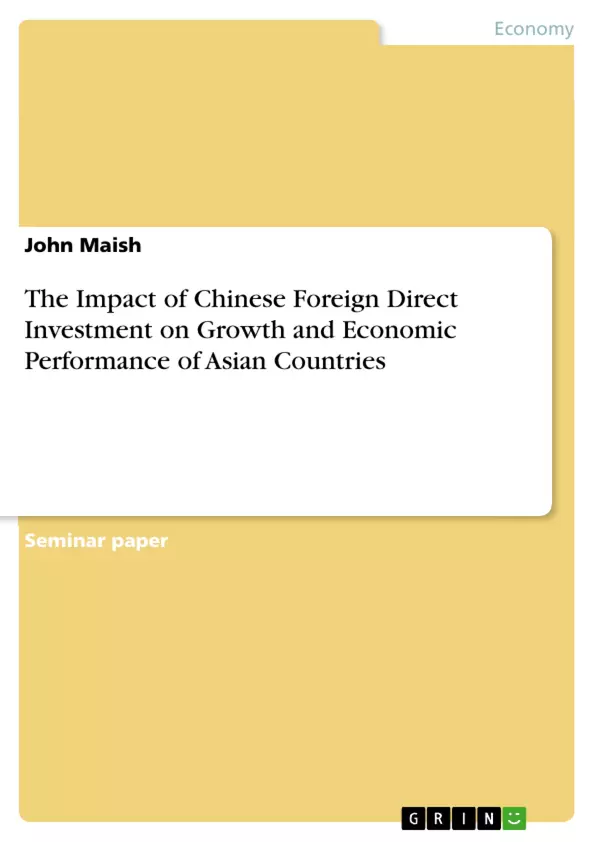What is the impact of Chinese foreign direct investment on the growth and economic performance of Asian countries?
In recent decades, China has progressively become one of the nations with the highest foreign direct investment (FDI) levels. The country has attracted more than $1.5 trillion in FDI during the last three decades. Notably, the large volumes of FDI inflows have promoted Chinese economic growth in terms of capital creation, export expansion, increased competition, employment establishment, and technology transfer. There exists a broad range of literature discussing the impact of FDI on economic development. Amongst those studies, it is universally agreed upon that FDI positively influences the economic growth of a country and a region. Still, some researchers have found that FDI leads to negative effects on the economic growth of a host nation. Only a few studies have focused on specific FDI from one nation or the influence on diverse developing countries. As such, my study aims to fill gaps within this research.
The proposed study examines the impact of Chinese-specific FDI on the growth and economic performance in six Asian states – Singapore, Japan, South Korea, Malaysia, the Philippines, and Indonesia. The research will use a cross-country log-linear regression, analyzing the data from 2010 to 2019. To my understanding, no study has specifically examined the effect of Chinese FDI on growth and economic performance using a similar time range. The data from the selected six Asian countries will help identify the variations of FDI on the economic development of the entire region. I will contain all relevant data for all nations within the panel data set. By focusing on these countries and the particular time range, I will help improve the existing literature.
Inhaltsverzeichnis (Table of Contents)
- Introduction
- Literature Review
- Data
Zielsetzung und Themenschwerpunkte (Objectives and Key Themes)
This study aims to investigate the impact of Chinese foreign direct investment (FDI) on the growth and economic performance of six Asian countries: Singapore, Japan, South Korea, Malaysia, the Philippines, and Indonesia. The research will utilize a cross-country log-linear regression to analyze data from 2010 to 2019.
- Impact of Chinese FDI on economic growth in Asian countries
- Analysis of FDI's contribution to GDP growth in the selected countries
- Exploration of the role of Chinese FDI in driving economic development in the region
- Comparison of FDI's influence across different Asian economies
- Identification of key factors driving Chinese FDI flows to Asian nations
Zusammenfassung der Kapitel (Chapter Summaries)
- Introduction: This chapter introduces the research question, outlining the study's objective to explore the impact of Chinese FDI on the growth and economic performance of Asian countries. It highlights the significance of understanding this relationship, given China's substantial FDI outflows and their potential influence on recipient nations.
- Literature Review: This chapter provides a comprehensive overview of existing research on the impact of FDI on economic growth. It summarizes key studies, including those by Forte and Moura (2013), Doku et al. (2017), and Choong and Liew (2009), highlighting both positive and negative effects of FDI. It also identifies gaps in the existing literature, particularly the lack of studies specifically examining the impact of Chinese FDI on Asian countries.
- Data: This chapter details the data sources and methods used in the study. It discusses the use of secondary data, including data from the World Bank's global Foreign Direct Investment database, to analyze the relationship between Chinese FDI and economic performance in the six selected Asian countries. The chapter also provides context on China's role as a major FDI recipient and its impact on developing nations.
Schlüsselwörter (Keywords)
This study focuses on key concepts such as Chinese foreign direct investment (FDI), economic growth, economic performance, Asian countries, cross-country log-linear regression, GDP growth, capital creation, export expansion, technology transfer, and business environment. The study aims to contribute to the understanding of the complex interplay between Chinese FDI and the economic development of Asian nations.
Frequently Asked Questions
What is the main objective of this study on FDI?
The study aims to investigate the specific impact of Chinese Foreign Direct Investment (FDI) on the economic growth and performance of six Asian countries between 2010 and 2019.
Which Asian countries are included in the research?
The research focuses on Singapore, Japan, South Korea, Malaysia, the Philippines, and Indonesia.
What methodology is used to analyze the data?
The study utilizes a cross-country log-linear regression analysis using panel data sets from the World Bank.
How does FDI generally promote economic growth?
FDI promotes growth through capital creation, export expansion, increased competition, employment establishment, and technology transfer.
Are the effects of FDI always positive?
While most literature agrees on positive influences, some researchers have found negative effects on the economic growth of host nations, which this study also explores.
- Quote paper
- John Maish (Author), 2021, The Impact of Chinese Foreign Direct Investment on Growth and Economic Performance of Asian Countries, Munich, GRIN Verlag, https://www.hausarbeiten.de/document/1388973


